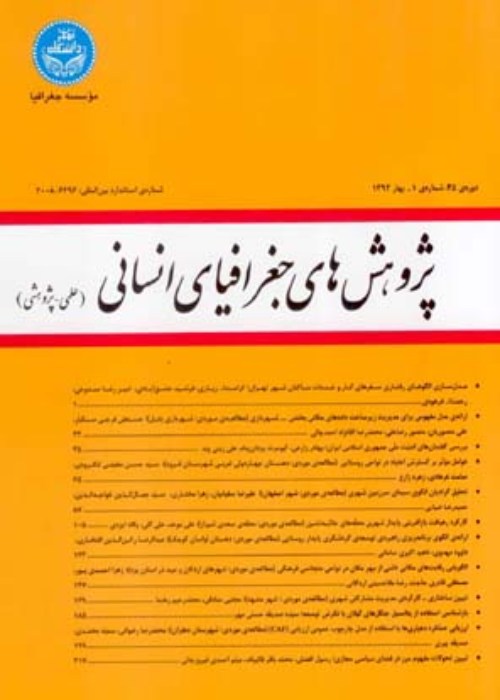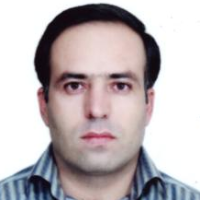An Analysis of the Challenges of Citizenship Rights in Iranian Citiesو Case study: Qazvin city
Citizenship is seen as an advanced model of "urbanization". According to some experts, urbanites have been promoted to 'citizens' when they respect each other's rights and fulfill their responsibilities to the city and society. Citizenship is a membership that includes a set of rights, duties and obligations, citizenship of an active or inactive individual in government with specified universal rights, and equality of obligations at a specified level. Citizenship is a social status associated with the state with three types of rights, including civil rights, political rights, and social rights. Citizenship represents the status granted by law. At the same time, this concept shows that individuals have the right to be credited with their status in society or a political unit. According to this approach, because people share a common life, they also have rights and responsibilities. Therefore, because of the same life together, whether in economic activity or in cultural affairs and in political commitment, they all have ethical obligations to one another. Citizenship is in fact the condition of membership in a political unit (usually the national government) that protects the rights and privileges of those who perform certain duties. More than citizenship, theory is a concept that formalizes the conditions for full participation in a society. The concept of citizenship represents the connecting point between social, cultural and political geography. Through a broader literature of citizenship theories can be found that these definitions have a common core: a kind of modern social base and role for all members of society, an interconnected set of duties, rights, duties and responsibilities, rights, obligations, obligations. Metaphorical and cultural equality, equal and equal sense of belonging and modern social membership for active and active participation in society and in the economic, political, social and cultural spheres, the just and equitable enjoyment of all members of society by social, economic, political, social and economic benefits, resources, Legal and cultural, regardless of class, race, religion And Ethnicity (Sarrafi, 2008: 118-120). The present study has attempted to present citizenship rights and its challenges in Qazvin as one of the important cities of Iran which has different citizens in terms of age, gender, ethnicity, language, literacy and physical health, etc. To investigate. The main question, therefore, is: What is the relationship between the four dimensions of socio-cultural, economic, environmental and civil service development with citizenship rights?
The present study is of applied purpose and descriptive and analytical. Also in this research, according to the content and nature of the research subject for data collection, both documentary and survey methods were used. Interviews were conducted with 18 professors and experts on the most important concepts of citizenship law, and the key key concepts about citizenship were categorized into 41 parameters. The reliability of the questions was confirmed by experts and the validity of the questions among the sample citizens (0.78). The statistical population of the study is 402748 citizens of Qazvin according to the latest census of the country. To determine the sample size, Cochran formula with 5% error coefficient was used and finally 384 people were obtained. Questionnaires were distributed in the form of closed-ended questions and Likert scale in 5 completely appropriate, appropriate, average, inappropriate and completely inappropriate scales and then the average rating of the collected information. In order to analyze the research findings, the data collected by SPSS software and Pearson and Friedman correlation tests were used for descriptive and inferential analysis of the findings and finally the distribution of the phenomenon space (case study) was presented.
The results of the indicators and criteria examined in Citizenship Law in Qazvin show that among the studied criteria the indicators of employment with high averages are about 4 most satisfied. These indicators are: • Right to choose a job (4.06 average) • Right to manage and maintain a job (4.10 average) • Right to Job Creation Services (3.96 Average) • Right to Occupational Safety (4.24 Average) • Right to family living expenses (3.92 average) In contrast to the index that achieved the highest average, the indicators of social dimension are in poor condition, with the lowest scores being as follows; • Right to choose friends, companions and companions (2.31 average) • Right to higher education, vocational training and school education (2.60 average) • Right to elementary education, guidance, high school (2.38 average) • Right to religious and traditional rituals (2.47 average) • Right to preserve and disseminate traditional rituals (2.55 Avg.).
In relation to the independent variable of the present study (citizenship law) consisting of four dimensions of social, economic, environmental and physical rights with utilities and services, among which the most effective and determining factors among these factors related to social dimension And its related criteria, and it can be said to play a key role in citizens' satisfaction with the city and urban spaces, with employment and occupational safety measures based on the Friedman test giving the highest score and in descriptive statistics with Criterion of average satisfaction with citizenship rights in the field of employment, job security and freedom The job has been the right choice. It can also be noted that the facilities and services of the city are among the least effective factors in creating a sense of citizenship in the citizens of the city under study. Also, based on the results of the research, the problems related to the realization of citizenship rights in the study city can be categorized as follows: The right to access to court and counsel, the right to equal treatment, the right to choose friends, companions and associates, the right to freedom from unsafe and violent environment, the right to citizenship, the right to personal and family counseling, the right to primary education, counseling , High school and the right to access to utilities and services.
- حق عضویت دریافتی صرف حمایت از نشریات عضو و نگهداری، تکمیل و توسعه مگیران میشود.
- پرداخت حق اشتراک و دانلود مقالات اجازه بازنشر آن در سایر رسانههای چاپی و دیجیتال را به کاربر نمیدهد.




